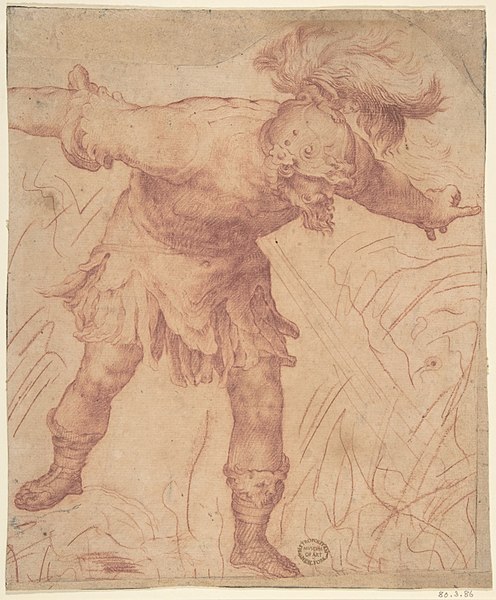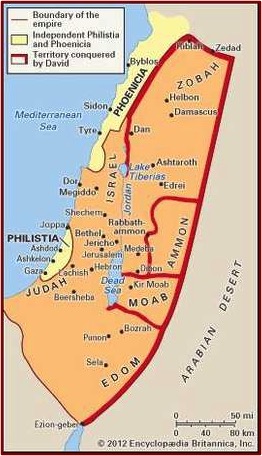It’s Good To Be King
We are introduced to Saul, who would be later anointed as king of Israel in chapter 9 of 1 Samuel. From the beginning, we hear problematic information about the man who would be king. On the one hand he was from a wealthy family; he was handsome and he was tall. He proved to be skillful in battle and able to inspire others to follow him. On the other hand, he was an inept shepherd who could not find donkeys that had wandered away from his father’s home. From the beginning it did not seem Saul would live up to his potential.
In his commentary on 1 & 2 Samuel, Robert Bergen said Saul’s future unfitness as a shepherd of the Lord’s flock is suggested in the narrative of chapter 9. “Semitic leaders throughout ancient times were often referred to as shepherds.” The patriarchs Abraham, Isaac, Jacob, and Moses were all depicted as skillful shepherds. Also recall Psalm 23:1, “The Lord is my shepherd; I shall not want.”
After three fruitless days searching for the donkeys, Saul was ready to give up and return home. Significantly, Saul did not think to seek divine help with his problem. It was his servant, not Saul, who recognized their need for spiritual guidance to find the donkeys. Also, Saul was apparently ignorant of who Samuel was, even though he lived nearby and was known to “all Israel” (3:20; 4:1). His cynicism or ignorance is also indicated by assuming spiritual favors had to be bought. “The future king’s life at this point was devoid of a spiritual sensitivity that looked to the Lord for help.”
One function of the Saul narratives is to depict the spiritual unfitness of the man who would serve as Israel’s first king. In so doing the writer demonstrates that Saul is spiritually, as in other ways, “a king such as all the other nations have.” Emblematic of Saul’s spiritual blindness is his initial encounter with Samuel. Though Samuel was the most famous and honored spiritual leader in Israel since the time of Moses, when Saul looked at him he saw only a stranger. The contrast between Saul and Samuel is striking: Samuel, the man of spiritual insight (the “seer”), knew all about an obscure young man even before he met up with him; Saul, the paragon of spiritual blindness, knew nothing of the most famous man in Israel even after he encountered him. The narrative motif of Saul’s incapacity to see the true nature of people would later be expressed in the context of his relationships with Jonathan, David, and Ahimelech. He would misjudge Jonathan to be an unworthy son and traitor; David, a treacherous revolutionary; and Ahimelech, a co-conspirator against the throne. All of these misreadings of others resulted in tragedy, both for Saul and others.
When Samuel met Saul, he invited Saul and his servant to stay with him overnight, telling them the donkeys have been found. The next day, Samuel said he had a private message from God for Saul (1 Samuel 10:1-8). The message was Samuel anointing Saul, telling him he would be leader over the Lord’s inheritance. Samuel also gave Saul confirmatory signs, saying he would meet two men who would tell Saul the donkeys have been found, but now his father was worried about Saul. Then he would meet three men going up to Bethel with provisions, and they would offer him two loaves of bread. Lastly, he would encounter a procession of prophets who would be prophesying. “Then the Spirit of the Lord will rush upon you, and you will prophesy with them and be turned into another man” (1 Samuel 10:6). All three situations happened to Saul.
Saul’s first confirmatory sign would authenticate Samuel’s word concerning the issue that had motivated Saul to seek the prophet in the first place; two men near Rachel’s tomb would inform him of the return of the donkeys and the mounting anxiety for Saul’s safety back in his father’s household. The second sign would confirm the authenticity and legitimacy of Samuel’s act of anointing Saul: three men on their way to a Yahwistic worship center in Bethel (cf. Judges 20:18, 26; 21:2) would present Saul with food designated for use by one who was anointed. Though “the two loaves of bread” (v. 4) were originally intended by the pilgrims as a gift for an anointed Aaronic priest, Saul’s acceptance of the food would require him to accept the legitimacy of his own anointing. The third encounter would confirm Samuel’s assertion that the Lord had also anointed Saul (v. 1). In the presence of a group of prophets, “the Spirit of the Lord will come upon you in power and you will prophesy with them” (v. 6).
When these three signs happen, Samuel told Saul he should “do what your hand finds to do, for God is with you. Then go down before me to Gilgal.” There Samuel would offer burnt offerings and sacrifice peace offerings. Saul was to wait seven days until Samuel came and showed him what he should do (1 Samuel 10:8). But this prophecy was not immediately fulfilled as were the three confirmatory signs. Saul grew accustomed to his position as king of Israel and seems to have disregarded this prophetic instruction, a mistake which would become the defining moment of his kingship.
Saul wasn’t a ‘king’ in the same sense as other kings. His anointing by Samuel symbolized a divine claim on him. Before this time, anointing was reserved for sacred objects (Leviticus 8:10-11, 30; Numbers 7:1). Robert Bergen noted where it was customary in Egypt to anoint vassal kings; those who owed allegiance to the great king or Pharaoh. Saul was the vassal king under Yahweh. “In Israel’s monarchy royal authority was derived and secondary; the king was always to be under the Lord’s authority.”
And since the Lord’s prophets were conduits through whom the divine word came to kings, these prophets were in reality superior to kings before Yahweh. Royal power was divinely set by God, and the Lord’s prophets were to define those limits. Here was the fatal flaw in Saul as king of Israel. He had little or no regard for Yahweh and his prophets and he trusted in his own judgments more than God’s guidance. He did what seemed right in his own eyes. “Samuel’s words to Saul were thus the opening volley in an enduring struggle between human political will and divinely inspired religious conscience.”
From a secular standpoint, Saul was the ideal personification of a king. He was handsome, tall, successful militarily, and enjoyed popular support. But Saul’s kingship was impaired by his disregard of God’s counsel. From the early days of his kingship Saul demonstrated a pattern of disobedience and poor judgment that continued through his reign as king for 42 years. Samuel’s final words to Israel warned both them and Saul to fear Yahweh and serve him faithfully with a whole heart: “But if you still do wickedly, you shell be swept away, both you and your king” (1 Samuel 12:25). Two years into his kingship, Saul revealed how he was unfit to be king over Israel.
In chapter 13 of 1 Samuel, we read how Saul’s military success against the Philistines had enflamed a Philistine retaliation, where they raised three thousand chariots (thirty thousand was a probable copyist error), six thousand charioteers, and soldiers as numerous as the sand on the seashore (1 Samuel 12:5). Saul called for the people of Israel to join him at Gilgal, which they did. But when they realized the magnitude of the Philistine response, they became fearful and began to desert. Saul was at Gilgal, as Samuel had prophetically directed him. He waited until the seventh day appointed by Samuel, watching his army progressively dwindling. When there still was no sign of Samuel, Saul decided to offer the burnt offering. As he finished offering it, Samuel arrived.
Saul tried to do a “meet and greet” that welcomed Samuel and attempted to engage him in the rituals Saul had already begun, but he would not have anything to do with it. Samuel responded to Saul’s actions with a curt question: “What have you done?” Knowing Samuel saw through his attempted manipulation of the situation, Saul defensively pointed out how the people were scattering, that Samuel himself didn’t come within the appointed time, and that the Philistines were mustering at Michmas. So not wanting to enter into battle without asking Yahweh’s favor, he forced himself to perform the sacrifice.
Samuel ignored Saul’s excuses and said he acted foolishly by usurping the Levitical privileges of offering sacrifices. The Hebrew word for foolishly expresses a lack of moral or spiritual sense. By his actions, “Saul displayed his utter lack of spiritual comprehension.” According to Bruce Waltke in the Theological Wordbook of the Old Testament:
The verb is mostly used in contexts where a man acts out of fear and thus behaves rashly, rather than acting wisely out of a confidence based in God. Thus David recognizes that he acted foolishly in taking the census of Israel in order to determine his military strength. It was a foolish act because he sought his security apart from God (II Sam 24:10; I Chr 21:8). This practical atheism the Babylonians used to call “living in a ramanishu,” i.e. living by oneself, on one’s own resources, without dependence on God.
Saul had disobeyed the Lord’s command and would suffer the consequences. Samuel said if Saul had obeyed the command of the Lord, then his kingdom over Israel would have been established forever. “But now your kingdom shall not continue. The Lord has sought out a man after his own heart” (1 Samuel 13:14). Not only would Saul’s dynasty not continue, but another leader was commanded by Yahweh to be prince over Israel.
Saul was selected as a vassal king, a prince or ruler over Israel, but under the Lord. His actions at Gilgal revealed his heart. He was not whole heartedly devoted to Yahweh. As a result, God selected another who was a man after his own heart, who would keep his commandments and follow him with all his heart (1 Kings 14:8). There is a theological pattern here that can be traced back to the Garden of Eden, demonstrating a parallel between Saul and Adam.
As Robert Bergen noted, both men were leaders; both violated commands given them by the Lord; both failed to take personal responsibility for their actions when confronted. Both Saul and Adam sought independence from God, believing they had the right to disregard the commands of the Lord when they thought circumstances called for it. But that is not the prerogative of a vassal who was supposed to be loyal and obedient in exchange for the protection and blessing of the greater king. When the vassal violated this covenant, the greater king withdrew his protection and blessing. We see the same pattern repeated in the history of the kings of both Israel and Judah: the loss of position and privilege are inevitable consequences of violating the Lord’s commandments.
This is not simply a lesson for political leaders—be loyal and obedient to God or be removed from office. All those who are called by God are vassals to his greater kingship and are to pledge loyalty and obedience to Him. It’s good to be a king or leader, but that calling comes with an obligation to the King of Kings and Lord of Lords (Revelations 17:14, 19:16).



